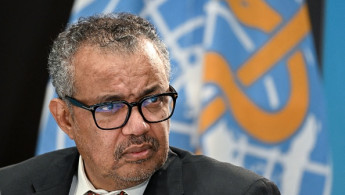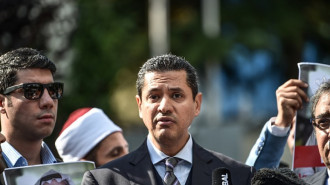Breadcrumb
WHO, Red Cross seek aid access amid Sudan fighting
The Red Cross and the World Health Organization on Tuesday urged Sudan's warring parties to guarantee humanitarian access for those in need as the death toll in the fighting neared 200.
Explosions rocked the capital Khartoum on the fourth day of fighting, despite growing international calls for an end to hostilities.
"All parties must ensure unrestricted and safe access to health facilities for those injured and everyone in need of medical care," WHO chief Tedros Adhanom Ghebreyesus told a press conference.
The United Nations currently has no access in or out of Sudan.
Spokeswoman Alessandra Vellucci said the UN had about 800 international and 3,200 national staff in the country.
"We are of course worried for the security, they cannot operate in a regular way," she said.
Nearly one third of the Sudanese population -- almost 16 million people -- needed humanitarian aid at the start of this year.
"We have thousands of volunteers who are ready, able and trained to perform humanitarian services" in the country, said Farid Aiywar, the Sudan head of delegation for the International Federation of Red Cross and Red Crescent Societies (IFRC).
"Unfortunately, due to the current situation, they are not able to move," he told reporters in Geneva via video-link from Nairobi.
Aiywar called on all parties to allow humanitarian aid corridors to operate.
Civilians are staying indoors but electricity and water have been cut and food supplies are short.
Tedros said supplies the WHO distributed to health facilities before the outbreak of violence were now exhausted.
He said Khartoum hospitals receiving injured civilians were reporting shortages of staff and lifesaving medical supplies, while they were also being hampered by fuel shortages and cuts to power and water.
"There are disturbing reports of some health facilities being looted and others being used for military purposes," he said.
"It is also reported that some hospitals are already closed, or on the brink of closure, due to attacks, and a lack of medical personnel and medical supplies.
"I urge all sides to heed the calls for a humanitarian ceasefire, to silence the guns and to work towards a peaceful resolution."






![Anthony Blinken speech [Getty] Anthony Blinken speech [Getty]](/sites/default/files/styles/image_684x385/public/media/images/6263436E-8ACD-4D3C-9055-25A7BE79DD5A.jpg?h=d1cb525d&itok=fLHmHCRG)
 Follow the Middle East's top stories in English at The New Arab on Google News
Follow the Middle East's top stories in English at The New Arab on Google News
![trump putin summit [getty] trump putin summit [getty]](/sites/default/files/styles/image_330x185/public/media/images/FC0BAC95-8593-4C01-91E0-A54F5BA9C681.jpg?h=d1cb525d&itok=VSb-ozsZ)

